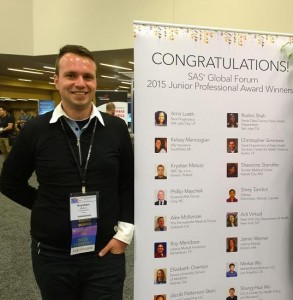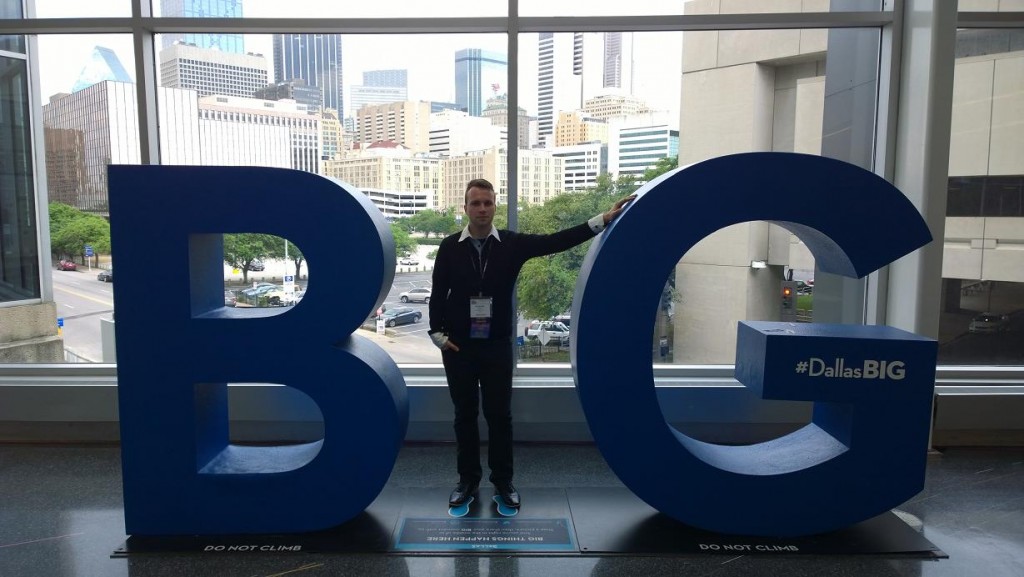Krystian Matusz is what I’d call a super SAS user. He currently holds seven out of the nine credentials SAS offers.
- SAS Certified Advanced Programmer for SAS 9
- SAS Certified Base Programmer for SAS 9
- SAS Certified BI Content Developer for SAS 9
- SAS Certified Clinical Trials Programmer Using SAS 9
- SAS Certified Data Integration Developer for SAS 9
- SAS Certified Platform Administrator for SAS 9
- SAS Certified Visual Business Analyst: Exploration and Design Using SAS Visual Analytics

That makes him part of an elite group of only about a dozen people who hold that many credentials.
Since we love numbers at SAS, I decided to look into whether anyone has earned all the credentials. I found out that only three people have earned eight credentials. And no one has earned all of them. At least not yet.
Krystian is currently preparing to take the SAS Certified Statistical Business Analyst exam this fall. He’s also a beta tester for our latest credentials, SAS Certified Data Quality Steward.
So what drives someone to go after all the credentials? And how much do you need to prepare for each exam? Those are just a few of the questions I asked Krystian – the super SAS user.
1. Why did you decide to earn so many SAS certifications?
I am a self-motivated and ambitious person. I am always willing to learn and love to challenge myself. I focus on final results and customer's point of view to understand what the customer wants and what his needs really are. Thanks to the certificates, I can better advise them and generate the highest business value as possible for them.
These achievements prove my skills, expertise and knowledge. They give me an opportunity to extend my knowledge and to deliver the best advice for architects and technical/business board teams (e.g. CTO and software architects). The knowledge from my education and exams allows me to deliver the best implementation: pure code, optimal solutions and great working software with clear results: reports, graphs, documents, KPI, KGI and hints for stakeholders. Also, SAS software is one of my favorites. I admire it for its potential.
2. How have the credentials helped you in your career?
The credentials have helped me become a real expert. They have allowed me to implement sophisticated solutions and deal with limitations and restrictions contained in the stakeholders’ requirements. Thanks to all credentials and time spent on learning, I can accomplish even the most difficult tasks.
It also gives me confidence and broadens my horizons. It has allowed me to create the best suitable solutions for my employers and stakeholders in several bigger projects that I have participated in in Europe.
I took out a loan to pay for each exam by myself. I am a person who is extremely curious and eager for knowledge. I wake up early in the morning to learn every day (the same at night, instead of sleeping). I have a passion for SAS software, big data topics and its possibilities. I work as a SAS programmer and architect, so I face and deal with the hardest problems and requirements. In my daily work, I am always doing my best to implement everything in a different way. For me it means an opportunity to learn new things.
To give you an example - let's suppose you use standard generic data step instructions in your processing. If you have a similar task, don’t copy and paste this well-known piece of code. You should try to do it in a different way that would challenge yourself (for instance, you may use hash maps).
Taking the SAS certification exams gave me a great overview about features and finally how SAS products can fulfill the business needs. It shows the possibilities, pros and cons and where there are traps. Consider one quick sample that you should keep in mind: NODUPREC (alias NODUP) and NODUPKEY options. It is crucial to understand how it internally works to avoid future logical and implementation errors. When I compared the quality of my production source code and its performance, I was surprised to see the degree of improvement my solutions achieved.
To wrap everything up for you, the credentials allows me to do many things differently, which simply means 'in a better way.' I am sure that it allows me to know how to better act and react in several implementation cases (proof of concept, RTM implementation) etc. It gives me an awareness what is the implications to e.g. use or MSGLEVEL, nosorted option, threads, feedback stimer in proc sql, use proc sql _method or _tree option to analyze a query process and code debug purposes etc.
Deep knowledge of how SAS works and how to fulfill the client requirements allows me to give everyone better recommendations for implementation. The knowledge gives me the power to know how to better act in several implementation cases. The credentials show me how to do the best optimal deliverables in this cutting-edge technology.
3. How much time did you devote to studying? What were the preparation materials you found most useful?
I spent an average 2.5 - 3 months preparing for each exam. In my opinion it's a short period of time, but I studied mainly during sleepless nights when no one could disturb me. That’s the time I had the best programmer's flow. I did not focus on exam topics only. Each time I found something that was interesting for me and tried to explore the whole topic. I am sure that this extends my point of view about the topics that the exams cover.
The best materials for preparations are SAS books and published case studies.
Right now, I am focusing on multiple imputation of missing data, time series analysis and predictive modeling. I’ve been learning more about these topics from the books I bought during SAS Global Forum 2015 in Dallas. It is good to read SAS manuals (like SAS Base 4GL) and publications from conferences (most of them are available online).
Secondly consider visiting the SAS website. If you are a SAS administrator, I recommend that you to read the Metacoda blog by Paul and Michelle Homes. Statisticians, analysts and programmers should be familiar with Lex Jansen portal. If you want to learn SAS Visual Analytics, among other topics, check out the tutorial library and other webcasts.
Once again, it's crazy but I spent my last holidays in SAS training, webinars etc. because these are the things I enjoy the most.
4. How much has your hands-on experience with SAS software helped with your preparations?
I have been working with SAS software professionally for almost three years now and I would say that hands-on experience and knowledge is very important. It’s absolutely crucial! In my case, my experience bases largely on my knowledge and all my self-education. I would also like to emphasize that I was always given the most difficult tasks and I completed them with success. It is crucial to know exactly how the tool works and how SAS executes the code. Practice is absolutely necessary.
5. Do you have any advice for others preparing for SAS certification exams?
First, I would say to keep calm, practice and work hard. Remember that everything that is worth doing is usually really hard, but you will get huge satisfaction. You should have fun with learning and discovering new things. Steve Jobs said, "You have to be burning with an idea, or a problem, or a wrong that you want to right. If you're not passionate enough from the start, you'll never stick it out.” Have a passion, self-discipline and fun!
Secondly, as I mentioned practice is crucial. Prepare well before taking the exam. Read the exam content and what the exam covers. Bear in mind undocumented SAS options. Don’t worry about asking for help or support if you do not understand something. If you do not find an answer, you can always reach out to me and ask. You can find me on LinkedIn.
For example, five days ago a SAS employee from Germany wrote to me to ask how to solve a tricky problem in SAS 4GL. I sent him detailed step-by-step solutions. That’s the power of the SAS community – to ask and help each other.
Thirdly, have a customer-centric approach and focus on the best optimal solution that makes a difference for potential clients. Be humble and never, absolutely never, stop learning.
Notice that I have passed almost all of the SAS exams and I am still learning to prepare for the last one. That is because I like to learn new things and become better at what I do. But even if you passed two or three exams, it is good to listen to others. There are always people who do not have any certifications, but they are masters of this technology.
Last but not least, have a goal. You can start your day with reading the “Tip of the day” on the SAS communities. If you learn just one thing per day, after one year you have 365 new ideas!
Summary my 4GL implementation:
Data MyHintForYou; Set WorkHard.BeSASsy(keep = passion patience curiosity motivation); IF (Are_You_Ready EQ ‘TRUE’) then do LearnAndLiveYourSASPassion; Else YouWillMissAnUniqueChanceInLife; Run; |
6. In your opinion, what was the toughest SAS certification exam?
I have almost 30 current and valid certificates in different leading technologies, but in my opinion the SAS exams are the hardest that I have ever passed. They require deep knowledge. You have to put all your skills on the table to pass it. Questions are well written and understandable. The purpose of each single question is clear.
In my case the toughest SAS certification exams were the Clinical Trials Programmer Using SAS 9 and Data Quality Steward for SAS 9. The questions were very demanding and challenging. To answer them correctly you must have deep knowledge, curiosity and of course hands-on experience. You have to be familiar with not only the tool (e.g. DataFlux Data Management Studio), but also the methodology and approach. You have to visually know the tool (e.g. DataFlux), know the data models (CDISC ADaM & SDTM), know the contents and purpose of define.xml. You have to understand several undocumented options in 4GL like threads, feedback etc. Don't focus only on MPRINT, SYMBOLGEN, MLOGIC, MACROGEN. I can assure you that all the SAS exams covers a wide range of topics and will show all your strengths and weaknesses.


12 Comments
Lakshmi good luck in your future endeavours!
Lakshmi - my mission fulfilled after passing all exams so it's time to challenge
others. Best of luck!
Great to see you completing all the certifications Krystian. I am not challenging you. I am just a follower of you, How can I challenge.
Lakshmi - my mission fulfilled after passing all exams so it's time to challenge
Best of luck!
Would like to see you as SAS Certified Data Scientist!! 5 more certifications on the way. Am following you.
Challenge accepted. Mission accomplished!
Pingback: Serving up SAS training in cities near you | SAS Learning Post
Quite an accomplishment. BRAVO!
Michelle, Art - it was pleasure to met you in person at SASGF too!
Przemek - thanks! Let's try{} catch{}.
Thank you all for kind words!
Krystian
Krystian, It was great meeting you at SASGF in Dallas. Winning Junior Professional honors is also no mean feat. I have to agree that learning is where the fun is, and with SAS there is always more to learn.
Congratulations! Krystian - maybe you will be first person in the world with ALL SAS Certificates :)
Have fun and do it your way! All the best!
Congratulations Krystian on your achievements and preparations for your next certification! It was lovely meeting you at SAS Global Forum. Thanks for mentioning the Metacoda website for SAS administration. Another resourceful technical blog for SAS admins is Paul's http://platformadmin.com blog
Kind Regards,
Michelle